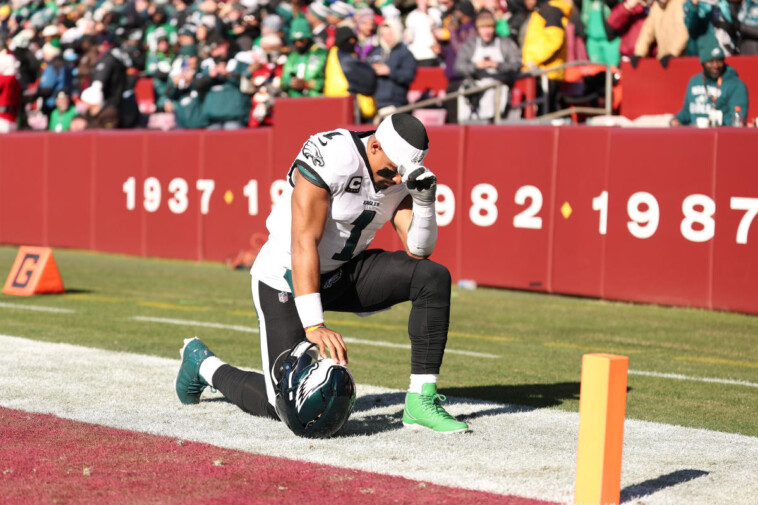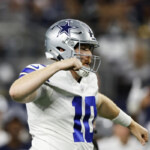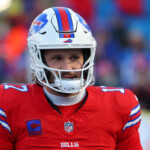Nick Sirianni corrected the phrasing.
A reporter asked the head coach how his Philadelphia Eagles responded after losing franchise quarterback Jalen Hurts to a concussion.
Hurts sustained a concussion in the first quarter of a 36-33 loss to the Washington Commanders on Sunday, leaving Kenny Pickett to play relief after just four passes.
“What about adjusting on the fly when Kenny comes in?” the reporter asked. “Because he’s obviously a much different quarterback than Jalen as far as being a plus-one [able to pass and run].”
Sirianni didn’t touch the end of the query. He instead honed in on the beginning.
“There’s nothing we leave to ‘something we do on the fly,’” Sirianni said. “There are times we have to adjust certain things, but we go into the game with a plan if that were to happen. We go into a game with a plan if [two quarterbacks] were to go down.
“That’s not something that’s an on-the-fly thing.”
If the response bordered on sensitivity, Sirianni may have reason for that. Head coaches will rarely say out loud that losing their starting quarterback cost them a game. Sirianni instead repeatedly emphasized accountability across the team and particularly on him as head coach.
And yet, what Sirianni didn’t say came across as loudly as what he did say: No matter how well the Eagles plan for the loss of their franchise quarterback, their backups will not be able to replicate the dual-threat ability Hurts brings.
Pickett does not have Hurts’ arm and he does not have Hurts’ long-established chemistry with targets including A.J. Brown and DeVonta Smith. Pickett does not receive regular practice reps with either one, he confirmed, the quarterback also reminding reporters that offensive coordinator Kellen Moore had not previously called a game with Pickett in charge of executing.
The nuance matters because even if Sunday’s adaptations against the Commanders enable the Eagles to be more prepared for a Pickett return than they were in his first meaningful action (he had attempted three total throws in the Eagles’ first 14 games), Philadelphia’s lofty postseason goals will suffer if Hurts’ injury lingers into multiple weeks.
The passing game wouldn’t be the biggest casualty.
Take the Eagles run game with Hurts … and then, without
Coming off a pass-heavy win the prior week against the Pittsburgh Steelers, the Eagles leaned heavily on the run game to start against the Commanders.
Saquon Barkley’s first rush went for 19 yards and his next for 13. Fellow running back Kenny Gainwell got a carry and Hurts scrambled himself. In all, Philadelphia’s first drive included six carries and two incompletions. No matter that they passed for zero yards. With Hurts in the game, and a turnover-on-downs shortened field, Barkley capped off the Eagles’ first series with a 2-yard touchdown run.
And Philadelphia was poised to continue that.
Defensive tackle Jalen Carter stripped Brian Robinson on the Commanders’ first play of the next series, the fumble returning the ball to the visitors. Hurts found Smith for 11 yards and then scrambled for 22. Why wouldn’t he scramble again to lighten the load on second-and-20?
But it was then that Hurts hit his head. On a zone-read keeper, which will expose a quarterback more than a mere pass, Hurts suffered the concussion that ruled him out for the final 54 minutes and eight seconds of the NFC East contest.
At that point, the Eagles had rushed eight times for 79 yards and a touchdown, a whopping 9.9 yards per carry.
They’d keep the running momentum going a bit longer, as Barkley followed lead blocker C.J. Uzomah through defenders with 2:29 to play in the first quarter, exploding as he hit the next level en route to a 68-yard touchdown.
But what in the first quarter looked like a day when the Eagles’ lines of scrimmage would simply overpower those of the Commanders would not continue.
Without Hurts, the Eagles’ average yards per carry dropped from 9.9 to 4.3 yards including the 68-yard burst. Remove that outlier, and the Eagles cobbled together just 2.13 yards on their non-Hurts carries.
Barkley managed 27 yards on 16 second-half carries. Without a reliable run game, the Eagles found themselves in unfavorable down and distances, unable to keep drives alive. They kicked four field goals after halftime but scored no second-half touchdowns in a game they lost by three.
Five defensive takeaways were not enough to overcome a run game telegraphed without Hurts’ combined decoy and production.
Hurts directly, indirectly powers Philadelphia’s league-best rushing attack
Quiz a friend on who led the league in rushing touchdowns entering this weekend and you probably will stump them.
The Baltimore Ravens’ Derrick Henry is a good guess, with an impressive 13 ground scores. The Buffalo Bills’ James Cook tied Henry at 13, while a three-way tie at 12 includes the Lions’ David Montgomery, Green Bay Packers running back Josh Jacobs and the Los Angeles Rams’ Kyren Williams.
Barkley is one of four players who entered the weekend with 11.
But hovering over all of the productive running backs with the most scores by ground entering this week was a quarterback: Hurts had 14.
Sometimes the Eagles have powered their trademark “Brotherly Shove” to send Hurts into the end zone. Other times, he simply reads the offensive line he has come to know so well and lets his athleticism and instincts take it from there.
When Barkley entered this week leading the league with 1,688 rushing yards, he knew his skills were necessary but not sufficient ingredients to explain. The Eagles’ offensive line is far superior to what Barkley ran behind with the Giants. Brown and Smith headline a far more lethal receiving corps than Barkley’s counterparts commanding defensive attention during his six seasons in New York.
And then there’s Hurts. His impact on the running game cannot be overstated. Just ask Barkley.
“A lot of things we do in our run game is designed with Jalen,” Barkley said. “It’s kind of hard to continue to run the same stuff when he’s not in there. So we had to adjust [and] just didn’t make the plays we needed to make.”
The Eagles have already clinched their playoff berth. They still control their path to the division title and a home playoff game. Hurts could still recover quickly enough to clear concussion protocol before the Eagles host the Dallas Cowboys next week, weeks before the postseason begins.
Sirianni said he had no updates on Hurts’ health after the game nor his return timeline.
“Anything that has anything to do with the head is out of our hands,” Sirianni said.
It’s too soon to say when Hurts will return. It’s not too soon to say the Eagles’ success, especially in the run game, will hinge heavily on his availability.
“He’s our starting quarterback,” Barkley said, “Everything we do, and what he’s able to do, is the reason why we’ve been super successful.”



